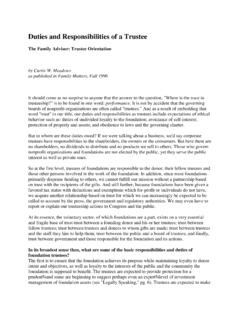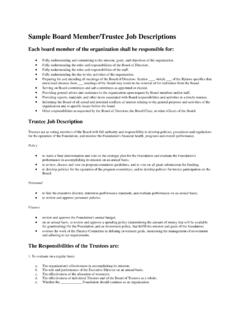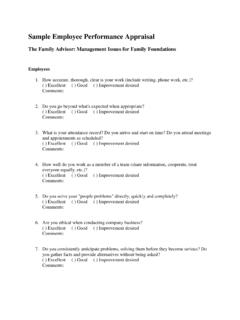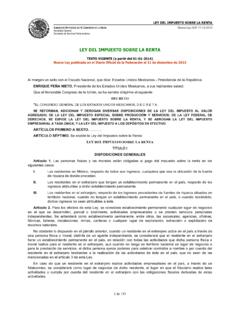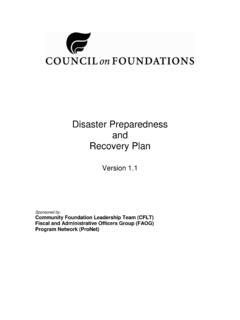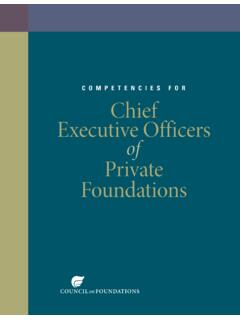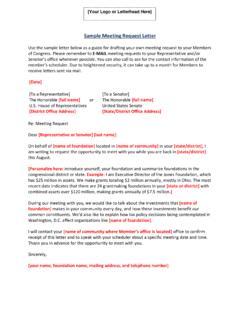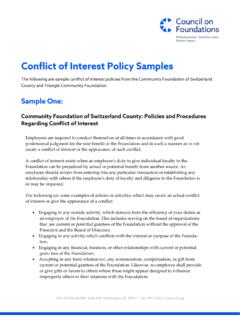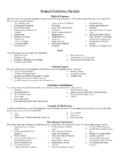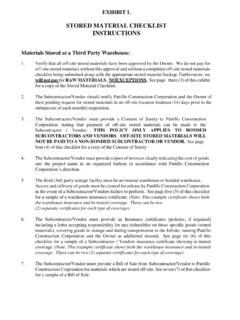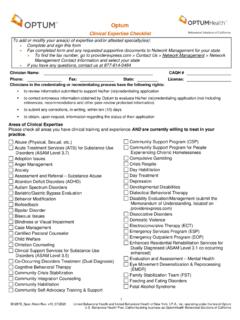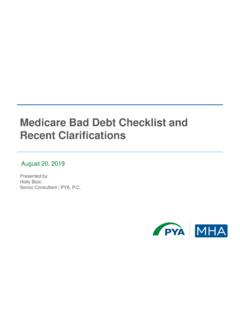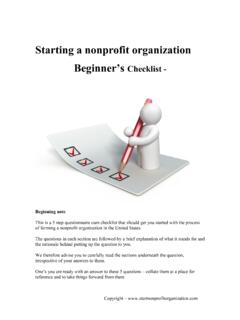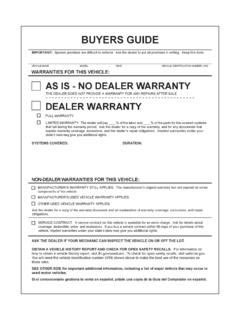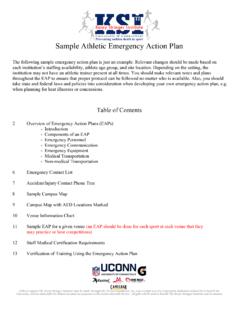Transcription of A Compliance Checklist for Private Foundations
1 Council on Foundations . Copyright 2010. All Rights Reserved. Page 1 By Jane C. Nober* The persistent scrutiny of nonprofit governance has prompted leaders at many types of organizations to take steps to assure that their own houses are in good legal and financial order. For Private Foundations , this Checklist is a good place to start. Wouldn't it be great if you could assure yourself that your foundation is following all applicable laws and regulations simply by working your way through a Checklist ? Unfortunately, the legal aspects of Private foundation management are too complicated to review that way. All the same, we have developed the following Checklist and offer it as a helpful tool to begin the assessment of whether a foundation is operating in accordance with the relevant legal requirements and whether any modifications to foundation legal documents or procedures are necessary.
2 The list is, of course, no substitute for consultation with an attorney who is knowledgeable about the ever-changing laws that apply to Private Foundations and the operations of your particular organization. Organizational and Operational Documents A. Articles of incorporation or declaration of trust. This document is the "constitution" of your foundation, its formative document. The following questions should be asked and reviewed: 1. Are the foundation's activities authorized by the purposes set forth in its articles or declaration? 2. Is the actual number of foundation directors or trustees in accordance with the number required in its articles or declaration?
3 3. Are the registered agent and registered office that are named in the articles or declaration still appropriate, or should the foundation notify the appropriate state office (secretary of state or attorney general) of its current registered agent/or office? 4. Are any provisions authorizing the foundation to indemnify directors, officers and/or employees consistent with current law? Many states have revised their laws regarding indemnification. 5. Have your articles or declaration been amended since your organization applied for exempt status? If so, you are required to notify the IRS of the changes and submit a copy of the revised articles.
4 B. Bylaws. State laws governing nonprofit corporations require bylaws. Bylaws are the rules that govern a corporation's day-to-day operations, meetings, the election of officers and directors or Check This A Compliance Checklist for Private Foundations Check This Council on Foundations . Copyright 2010. All Rights Reserved. Page 2 trustees and other governance issues. Some Foundations organized in trust form have also adopted bylaws to guide their managers. The following questions should be asked and reviewed: 1. Are meetings of directors or trustees held at the times and in the places required by the bylaws? Is an annual meeting required by state law?
5 2. Are notices of meetings given (or appropriate waivers obtained) in accordance with the notice requirements in the bylaws? 3. Are the activities of each officer of the foundation consistent with the activities prescribed for such office in the bylaws? 4. Does your foundation have all of the officers that its bylaws require it to have? 5. Do the bylaws require the existence of an advisory committee or any other such group? If so, does your foundation have such a committee or group, and are its actions in accordance with the rules set forth in the bylaws? 6. Are your foundation's procedures for naming new and substitute directors and officers carried out as directed in the bylaws?
6 7. Are additional bylaws desirable to govern activities of your foundation or its managers that are not fully delineated in the current bylaws? 8. Do the bylaws authorize such things as the holding of meetings by telephone or other virtual means or action by the directors by unanimous written consent, instead of the holding of a regular meeting? Most states allow board meetings to take place virtually under the condition that all board members can hear one another simultaneously. This would include, among others, teleconferencing, videoconferencing and web conferencing. A few states, while allowing virtual meetings, require the full board to consent to meeting virtually.
7 HINT: E-mail can be a handy way for scattered directors to reach consensus on foundation issues, but most states have not yet amended their nonprofit corporation laws to permit voting by e-mail. Those that do may require unanimous votes, which may be practically unfeasible. In addition, there are some that question how secure voting by email is. Check to see what your state allows before relying on a vote taken by e-mail. 9. Are indemnity provisions consistent with current law and your Articles of Incorporation? 10. If the bylaws require use of a corporate seal, does your foundation have such a seal and is it used regularly?
8 HINT: You don't have to have a corporate seal if you don't want one. Usually, you can amend your bylaws to eliminate the corporate seal. 11. Do the bylaws require certain financial accounting activities, and, if so, are your foundation's actual activities in accordance with these requirements? 12. Does anything in the bylaws conflict with statements made on your foundation's application for its federal tax exemption? If your bylaws have been amended since you applied for Check This Council on Foundations . Copyright 2010. All Rights Reserved. Page 3 exemption, have you sent the IRS a copy? IRS rules require that you provide them with a copy of your bylaws if they have changed.
9 13. Are your bylaws consistent with both state law and your articles of incorporation? If not, your bylaws will need to be amended. Documents Relating to Federal Tax Exemption You should be familiar with the following documents relating to your foundation's exemption from federal income tax and be sure they are kept in a safe place: A. Form 1023, the application for recognition by the Internal Revenue Service (IRS) as a tax-exempt organization. You need to keep a complete copy of the application along with all attachments and schedules. You should also keep copies of any correspondence between your organization and the IRS relating to the application.
10 B. Form SS-4, the application for employee identification number. C. The IRS's favorable determination letter certifying that your foundation is exempt from income tax and specifying that it is a Private foundation or a Private operating foundation. Hint: You should check IRS Publication 78, The Cumulative List of Organizations Contributions to Which Are deductible Under Section 170(c) periodically to be certain that your foundation is listed accurately. Private Foundations are indicated by a footnote "4" and operating Foundations by a footnote "3." D. Any IRS letters approving your foundation's grantmaking procedures. Such a letter is normally required for grants to individuals for study or travel or for set-asides (see below).

